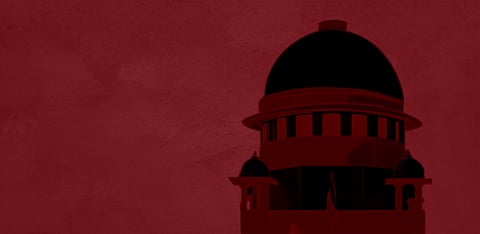

Both Thakur and Verma had allegedly made hate speeches targeting civil society protesters against the Citizenship (Amendment) Act in 2020. An additional chief metropolitan magistrate had refused to direct registration of FIRs against them for their speeches; this had been upheld by the Delhi High Court.
—
ON Monday, a Supreme Court division Bench comprising Justices K.M. Joseph and B.V. Nagarathna issued notice to the Delhi police on a petition filed by Communist Party of India (Marxist) leader Brinda Karat challenging the Delhi High Court's verdict from last year upholding the order of an additional chief metropolitan magistrate (ACMM) who refused to direct registration of a first information report (FIR) against Union Minister Anurag Thakur and parliamentarian Parvesh Verma, both from the Bharatiya Janata Party, for their alleged hate speeches against anti-Citizenship (Amendment) Act protesters in January 2020.
Thakur at a rally in Rithala had shouted the slogan "Desh ke gaddaron ko" (traitors of the nations) and exhorted the crowd to respond with "goli maaron saalon ko" (shoot the rascals).
In an interview with a news agency, Verma is stated to have threatened to use force to remove protestors from Shaheen Bagh, and called them "invaders".
The Bench, led by Justice Joseph, orally remarked that the reasoning of the ACMM that a sanction under Section 196 (prosecution for offences against the State and for criminal conspiracy to commit such offence) of the Code of Criminal Procedure (CrPC) was required to file an FIR, might not be correct.
He also observed that the "goli maaro" chant was certainly, "not in terms of medical prescription".
Senior advocate Siddharth Agarwal, appearing for Karat, argued that the ACMM erred in holding that sanction was needed to register an FIR. He submitted that the words 'goli maaro' culminated into real action after a person fired at the protesters within the next few days.
Agarwal also referred to Delhi High Court's proceedings in which a bench led by Justice S. Muralidhar commented strongly against the speeches made by Thakur and Verma, and wanted an FIR against them. He contended that the requirement of sanction to register an FIR is for offences under the Prevention of Corruption Act, not for the offences under the Indian Penal Code (IPC).
Agarwal also drew the attention of the Bench to the court's earlier order from last year by another division Bench, also comprising Justice Joseph, in which it had asked all state governments to register suo motu FIRs in hate speech cases.
On August 26, 2020, an ACMM rejected the petition filed by Karat under Section 156(3) (police officer's power to investigate cognisable case) of the CrPC, seeking registration of an FIR against Thakur and Verma, on the ground that the petitioner did not have previous sanction obtained from the competent authority to prosecute the duo for offences under Sections 153A (promoting enmity between different groups on grounds of religion, race, place of birth and residence), 153B (imputation and assertions prejudicial to national integration), 295A (deliberate and malicious acts intended to outrage religious feelings of any class by insulting its religion or religious beliefs), 298 (uttering words, etc., with deliberate intent to wound the religious feelings), 504 (intentional insult with intent to provoke breach of the peace), 505 (statements conducing to public mischief) and 506 (punishment for criminal intimidation) of the IPC.
The order of the ACMM was challenged before the Delhi High Court by Karat via a writ petition under Article 226 (power of high courts to issue certain writs) read with Article 227 (power of superintendence over all courts by the High Court) of the Constitution.
A single judge of the high court, Justice C.D. Singh, had dismissed the petition, holding that:
Justice Singh had also taken note of the fact that the investigating agency, upon conducting its preliminary enquiry, had come to the conclusion that prima facie no cognisable offence was made out, and the ACMM could not have applied their mind to direct the investigation or for registration of FIR in the absence of valid sanction.